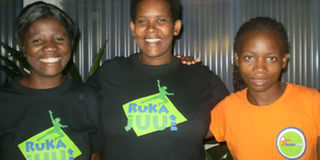Failure is not always final

Smile of victory: When one door closes, another one opens. PHOTO | ESTHER KIBAKAYA
What you need to know:
- Learning happens at any stage: Aziza, Yusta and Tatu Rashid are putting their farming skills to test, borrowing heavily from the training at the Sokoine University of Agriculture (SUA).
Despite challenges such as rights to ownership of land, financial support and agricultural training, these women spotted an opportunity and went for it.
Born and raised in humble backgrounds, these young women had their own aspirations for better and quality life.
Each of them yearned for a good job to provide for their families; but somewhere along the way, things didn’t go as planned.
They each led their own lives until recently when Ruka Juu-Young Farmers in Business competition brought them together. They were among the six finalists up from the 60 who had been picked for the contest,
Putting her act together
Yusta Mwilingi, 22, from Sumbawanga is a role model in the farming sector. Her journey began after her secondary school education ended with low grades.
That was in 2011. Her efforts to enroll in various courses were fruitless leaving her with just one option: Farming. This is something she has done since her days in primary school.
“My dream was to be a nurse, but since that wasn’t possible; I made a decision to devote myself to farming. I knew I could do it because I have the experience. I used to grow some crops to make some pocket money,” she said.
“I asked my parents for a piece of land and they gave me two acres where I planted maize. I started out with just Sh200, 000, bought seeds and all the necessary materials. I devoted my time to farming because this is what my family and I relied on.”
She has also managed to pay for her college fees from the returns.
“I also support my parents at home and buy school materials for my siblings. It pays to be a farmer, and I think it’s time the youth embraced opportunities that are available today.”
“Moving into town without much to do is a waste of manpower that could otherwise be used to make changes in our country,” she says.
However, these young farmers still feel that the government can do a lot to support them in their farming activities.
“We have limited access to loans that could help us increase our productivity. We are in need of farming tools, pesticides and opportunities to buy more parcels of land,” says Yusta adding that poor infrastructure is another problem that is pulling them behind.
Employment initiatives save the youth
As unemployment continues to affect the youth today, there have been sporadic efforts to help save the situation especially by promoting self-employment.
And this is what Femina, through its reality entrepreneurship competition is doing. For two years now, there have been competitions and this year’s turned attention to young farmers.
Their aim is for young people to understand the huge potential that agribusiness holds and that farming can mean money, job stability and security.
Aziza Juma, 29, a mother of three has learnt to appreciate farming since it has been her saviour since she failed her Standard Seven exams.
“My mother had land, which she had leased out. When the tenant left, I took that opportunity to ask for it.”
That is where her journey began. “I started planting maize, beans and rice and when my mother died in 2007, all my three siblings became my responsibility,” says Aziza.
“I raised them like my own children, thanks to farming and now they are all in school. The lastborn is about to finish primary school and the other ones are in secondary school.”
As a married woman, she can still take care of her siblings and her three children with the help of her husband.
“Farming has become my life. It has given me an opportunity to do the impossible, and today I am among the six finalists in this competition. I have learnt so much; how to process food and add value to it. The money I won today will help me when I get back home.”
Farming boosts the economy
Research shows that in developing countries such as Tanzania, agriculture plays an important role in poverty reduction.
An increase in agricultural activities means greater food security for people and growth of both individual and national income.
And this can be witnessed by Tatu Rashid, 22, from Mkinda village in Kilosa, Morogoro. She has engaged herself in agribusiness to earn a suitable income for her family.
Abandoned twice by two different men who impregnated her, Tatu, a mother of two can now manage her own family thanks to farming.
“When I got pregnant with my first child, I was enrolled in a tailoring course after I failed Standard Seven exams. I had to stay home until my baby was born,” says Tatu.
Welcoming a new born without support from the man who got her pregnant was a bit of a challenge, especially when she had other siblings and a single parent to take care of.
I helped my mother at the farm for three years before I became pregnant again.”
Sadly, the man who did it disappeared. She says the situation hit her really hard. With so many responsibilities on her shoulders, leaving her children with her mother as she sought other means of income wouldn’t be wise.
“That’s when I asked my mother for a piece of land,” she says
From a quarter acre given to her by her mother, now she has extended it to a three-quarter acre tomato (nyanya chungu) farm.“Well, I am happy now that I am financially stable. I can put food on the table for my family and I don’t need to depend on my mother. Instead, I help her more,” she says.




